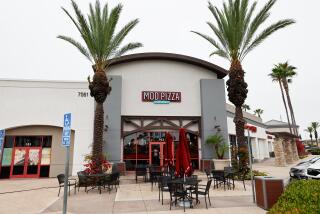Chart House to Try Going Public Again
- Share via
SAN DIEGO — Hoping for more success at going public than in its first try, which was aborted after the October, 1987 stock-market crash, Chart House Enterprises announced Thursday a second attempt in two years at completing an initial public stock offering.
According to a registration statement filed with the Securities and Exchange Commission, Chart House plans to sell 2.8 million newly issued shares priced from $11 to $13 each, meaning the company could raise up to $36.4 million. The offering is expected to close by September.
Operator of 73 restaurants, including 59 Chart Houses in 17 states, Chart House said it will use the proceeds from the offering to retire part of the massive debt it incurred when Chart House management and First Boston Co. teamed for an $87.5-million leveraged buyout of the company from former parent Pillsbury in 1985.
The Earlier Effort
Another 1 million shares will be sold by investment entities managed by First Boston Co., which is co-underwriting the stock offering with Montgomery Securities. The First Boston partnerships are Chart House’s largest shareholders, and combined own 69.4% of the about 5 million shares outstanding before the stock offering.
No other Chart House insiders or managers are selling shares in the offering.
In October 1987, the Solana Beach-based restaurant operator had received Securities and Exchange Commission clearance to sell stock when the market cratered on Black Monday, causing a cancellation. Executives had completed a 10-day road show of U. S. and European cities, talking up their company to investors, and all that remained for the offering to close was for the stock to be priced and distributed.
“Everyone at the company was disappointed to put up all the effort and not be able to follow through,” said Harold Gaubert, Chart House’s chief financial officer, who added that the cancellation cost the company $800,000.
Obviously Gaubert and his colleagues hope the second effort will follow a different scenario. The company is apparently no worse off financially, having recently reported a profit of $2.1 million on sales of $69.7 million for the six months ended June 30. That compares with a pro forma profit of $1.6 million on sales of $63.2 million for the same period the year before.
A seafood chain founded in San Diego in 1961, Chart House has gone through several ownership changes in recent years. In 1974, the company was acquired by Self Service Restaurants of Louisiana and, in 1983, combined with Godfather’s Pizza and Burger King in what became known as Diversifoods.
In mid-1985, Diversifoods was acquired by Pillsbury, which later that year spun off Chart House to management and First Boston.
Since the aborted stock offering two years ago, Chart House has added eight restaurants, including seven Chart Houses and a seafood eatery called Peohe’s in Coronado. The company also operates 13 Paradise Bakery restaurants it acquired in 1987, a chain that is located mainly in Texas but which includes one location in downtown San Diego. Chart House also has franchised 12 Paradise Bakery outlets.
Openings Planned
Chart House said it plans to open up to six more Chart Houses in 1990, as well as two more Paradise Bakery outlets, Gaubert said. Chart Houses are mainly on the East and West coasts, including five in San Diego County, Gaubert said.
Chart House chairman and chief executive John Creed, 52, owns about 9.8% of outstanding shares and vice president A. Shawn Holder owns about 2.3% of Chart House stock. Creed has been with the company since 1968 and Holder since 1970.
The company has 5,500 employees, the vast majority of whom are either hourly waiters and waitresses or clerical employees. About 75 administrative employees work at Chart House’s headquarters office in Solana Beach.
Assuming the newly issued stock sells for $12 a share, the proceeds from the stock offering will reduce the company’s long-term debt from the current $76.9 million to $49.2 million, bringing Chart House’s debt-to-capitalization ratio down from 81% to 51%, Gaubert said.
More to Read
Inside the business of entertainment
The Wide Shot brings you news, analysis and insights on everything from streaming wars to production — and what it all means for the future.
You may occasionally receive promotional content from the Los Angeles Times.










